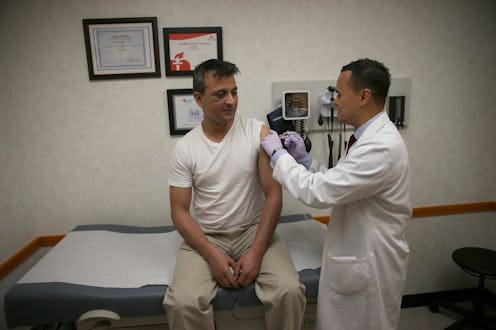News
The Flu Mutated And Now Your Flu Shot Won't Match
I hate to be the bearer of bad news, but this health PSA is too bizarre, I mean, important, to pass up — according to the Centers for Disease Control and Prevention (CDC), they've missed the window of opportunity to create a flu vaccine that actually protects you from this winter's flu, which means that your current flu shot "won't match" the strain of the virus floating around this season. Now, that isn't to say that you shouldn't get your flu shot regardless — I mean, if you're into needles, what have you got to lose anyway? But you should be aware that doctors have been warned that the vaccine is only "partially protective against the predominant flu virus." Oops.
According to the advisory, which doctors received Wednesday, over half of the 85 virus samples tested in October and November did not match the strain in the vaccine, which suggests that the influenza A (H3N2) virus has undergone a mutation. While this is not an uncommon occurrence, the CDC sort of missed the fix-it bus, as Dr. Tom Frieden noted, "It's too late to create another version of the flu vaccine this year because even with modern production technology, it typically takes about four months to produce the vaccine." So basically, by the time scientists would be able to produce an effective flu shot, you'd already have contracted and recovered from your illness about 10 times over (or am I the only person who spends the entire winter season sick?).
All jokes aside, however, this vaccine and virus mismatch could have serious consequences, as Frieden told CNN, "we could have a season that is more severe than most with more hospitalizations and more deaths." Worse yet, the H3N2 virus is already linked with a deadlier flu season than other strains of the virus. The Chicago Tribune reports,
Flu seasons dominated by influenza A (H3N2) strains tend to have higher overall hospitalization rates and more flu-related deaths, especially among older people and very young children compared with flu seasons dominated by the influenza A (H1N1) virus or influenza B viruses.
The flu vaccine currently available to Americans protects best against these less dangerous viruses, like H1N1 or influenza B, which is why a flu shot is still a good idea as a precautionary measure. But in previous years when the H3N2, or any version of the virus, for that matter, has mutated, doctors have seen less effective vaccinations and more hospitalizations as a result.
So what can you do to protect yourself this winter from contracting the flu? According to the CDC, there are still a number of measures you can take that should greatly lessen your chances of contracting any serious illness.
Get the flu shot.
Seriously. Even if half the virus samples don't match the vaccine, that still means that half of them do match, and it would be wise to protect yourself against that 48 percent or so. Moreover, even if the vaccine doesn't directly protect you against the mutated H3N2 virus, it will probably lessen its effects. As CBS News medical contributor Dr. Holly Phillips told "CBS This Morning," "...with H3N2, even if it's not a perfect match, you might still get some coverage. You might get the flu but you might not be as sick."
Consider FluMist.
The nasal spray version of the vaccine wasn't a good match last year for the H1N1 virus that was going around, but it may work this time. Plus, it's supposed to be more effective anyway because it uses a weaker, but live version of the actual virus. And yet another bonus, there are no needles involved.
Take Tamiflu or Relenza.
Despite the flu shot's shortcomings, the CDC is reminding people that there are drugs on the market that can also fight the virus, including Tamiflu and Relenza. While these medications may not be necessary for every person out there, if you or a loved one have certain risk factors that could result in complications from the flu, like asthma, diabetes, or heart disease, it may be a good idea to keep these names in mind.
Wash your hands.
Goes without saying, I know, but when everyone around you is sick, the best offense really is a good defense. And if you're going to wash your hands in a public restroom, maybe considering using paper towels instead of an air dryer, considering a new study that shows the rather horrifying spread of germs as a result of the paperless route.
Don't panic.
Not panicking won't protect you from getting sick, but panicking won't help either. After all, last year's flu vaccine, which was considered "successful," only had an efficacy rate of 55 percent, which isn't all that much higher than this year's projected numbers. So as annoying as it may be to know that your pesky flu shot may not be the cure all to your potential winter illness woes, it's not like it was ever that great anyway.
Images: Getty Images (6)
